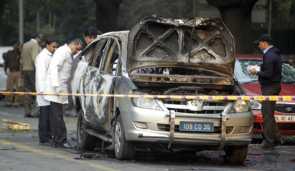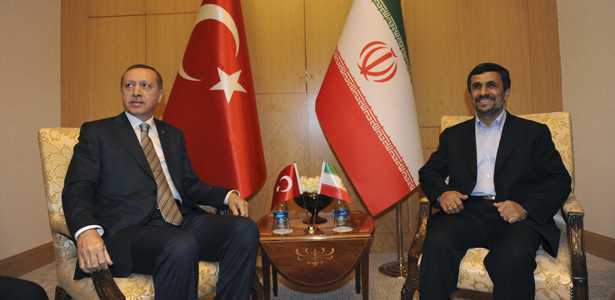The threat is not an idle one. According to sources close to the Israeli security establishment, military planners have concluded that never before has the timing for a unilateral military strike against Iran’s nuclear facilities been so auspicious.
It is an assessment based on the unforeseen consequences of the Arab Spring, particularly in Syria, which has had the result of significantly weakening Iran’s clout in the region.
Israel has always known that there would be an enormous cost in launching an attack on Iran, with the Islamist state able to retaliate through its proxy militant groups Hamas and Hizbollah, based in Gaza and Lebanon respectively, and its ally Syria.
Each is capable of launching massive rocket strikes at Israel’s cities, a price that some senior intelligence and military officials said was too much to bear.
But with Syria preoccupied by a near civil war and Hamas in recent weeks choosing to leave Iran’s orbit and realign itself with Egypt, Iran’s options suddenly look considerably more limited, boosting the case for war.
“Iran’s deterrent has been significantly defanged,” a source close to Israel’s defence chiefs said. “As a result some of those opposed to military action have changed their minds. They sense a golden opportunity to strike Iran at a significantly reduced cost.” Not that there would be no cost at all. With the rise of the Muslim Brotherhood in Egypt, Hamas has chosen to throw its lot in with its closest ideological ally and forsake Iran and its funding, but it could still be forced to make a token show of force if smaller groups in Gaza that are still backed by Tehran unleash their own rockets.
Likewise, Bashar al-Assad, the Syrian president, could seek to reunite his fractured country with military action against Israel.
Iran would almost certainly launch its long-range ballistic missiles at Israel, while Hizbollah, with an estimated arsenal of 50,000 rockets, would see an opportunity to repair its image in the Middle East, battered as a result of its decision to side with Mr Assad.
Even so, it is not the “doomsday scenario” that some feared, and a growing number in the security establishment are willing to take on the risk if it means preventing the rise of a nuclear power that has spoken repeatedly of Israel’s destruction.
“It won’t be easy,” said a former senior official in Israel’s defence ministry. “Rockets will be fired at cities, including Tel Aviv, but at the same time the doomsday scenario that some have talked of is unlikely to happen. I don’t think we will have all out war.” In itself, the loss of two of Iran’s deterrent assets would probably not be enough to prompt Israel to launch unilateral military action.
The real urgency comes from the fact that Israeli intelligence has concluded that it has only between six and nine months before Iran’s nuclear facilities are immune from a unilateral military strike.
After that, Iran enters what officials here call a “zone of immunity”, the point at which Israel would no longer be able, by itself, to prevent Tehran from becoming a nuclear power.
By then, Israel assesses, Iran will have acquired sufficient technological expertise to build a nuclear weapon. More importantly, it will be able to do so at its Fordow enrichment plant, buried so deep within a mountain that it is almost certainly beyond the range of Israel’s US-provided GBU-28 and GBU-27 “bunker busting” bombs.
It is with this deadline in mind that Mr Netanyahu comes to Washington. Mr Obama’s administration has little doubt that their visitor’s intent is serious. Leon Panetta, the US defence secretary, stated last month that there was a “strong likelihood” of Israel launching an attack between April and June this year.
Senior US officials have, unusually, warned in public that such a step would be unwise and premature, a sentiment echoed by William Hague, the Foreign Secretary.
Mr Obama is determined that beefed up US and EU sanctions targeting Iran’s central bank and energy sector be given the chance to work and is desperate to dissuade Israel from upsetting his strategy.
But to give sanctions a chance, Mr Netanyahu would effectively have to give up Israel’s ability to strike Iran and leave the country’s fate in the hands of the United States – which is why he is demanding a clear sign of commitment from the American president.
“This is the dilemma facing Israel,” the former senior military officer said. “If Iran enters a zone of immunity from Israeli attack can Israel rely on the United States to prevent Iran going nuclear?”
Mr Netanyahu’s chief demand will be that Washington recognises Israel’s “red lines”. This would involve the Barack administration shifting from a position of threatening military action if Iran acquired a nuclear weapon to one of warning of the use of force if Tehran acquired the capability of being able to build one.
Mr Obama will be reluctant to make such a commitment in public, though he might do so in private by pledging action if Iran were to expel UN weapons inspectors or begin enriching uranium towards the levels needed to build a bomb, according to Matthew Kroenig, a special adviser to the Pentagon on Iran until last year.
“Israel is facing the situation of either taking military action now or trusting the US to take action down the road,” Mr Kroenig, an advocate of US military strikes against Iran, said. “What Netanyahu wants to get out of the meeting are clear assurances that the US will take military action if necessary.” The American president may regard Mr Netanyahu as an ally who has done more to undermine his Middle East policy of trying to project soft power in the Arab world than may of his foes in the region.
But, on this occasion at least, he will have to suppress his irritation.
Mr Netanyahu is well aware that his host is vulnerable to charges from both Congress and his Republican challengers for the presidency that he is weak on Iran, and will seek to exploit this as much as possible.
Tellingly, Palestinian issues, the principal source of contention between the two, will be sidelined and Mr Obama has already been forced to step up his rhetoric on Iran beyond a degree with which he is probably comfortable.
Last week, in a notable hardening of tone, he declared his seriousness about using military force to prevent Iran acquiring a nuclear weapon, saying: “I do not bluff.” Yet whatever commitments he might give to Mr Netanyahu it is far from clear that it will be enough to dissuade Israel from taking unilateral action.
Among the Israeli public, there is a sense of growing sense that a confrontation with Iran is inevitable. Overheard conversations in bars and restaurants frequently turn to the subject, with a growing popular paranoia fed by the escalation in bomb shelter construction, air raid siren testing and exercises simulating civilian preparedness for rocket strikes.
Last week, Israeli newspapers fretted that the government was running short of gas masks, even though more than four million have already been doled out.
But while the growing drumbeat of war is unmistakable, it is unclear whether or not Mr Netanyahu, for all his bellicose rhetoric, has yet fully committed himself to the cause.
Ostensibly, a decision for war has to be approved by Mr Netanyahu’s inner cabinet. But everyone in Israel agrees that the decision ultimately rests with Ehud Barak, the defence minister who is unabashedly in favour of military action, and, most importantly, the prime minister.
“Netanyahu is a much more ambiguous and complex character,” said Jonathan Spyer, a prominent Israeli political analyst. “We know where Barak stands but with Netanyahu it is less clear.
“Netanyahu is not a man who likes military adventures. His two terms as prime minister have been among the quietest in recent Israeli history. Behind the Churchillian character he likes to project is a very much more cautious and vacillating figure.”
Were Mr Netanyahu to overcome his indecisiveness, as many observers suspect he will, real questions remain about how effective an Israeli unilateral strike would be.
With its US-supplied bunker busters, Israel’s fleet of F-15i and F-16i fighter jets, and its recently improved in-air refuelling capabilities, Israel could probably cause significant damage to the bulk of Iran’s nuclear facilities, including the Natanz enrichment plant.
But the second enrichment plant at Fordow, buried beneath more than 200 feet of reinforced concrete, could prove a challenge too far.
“Natanz yes, but I don’t think they could take out Fordow,” said Mark Fitzpatrick, an Iran expert at the International Institute of Strategic Studies in London. “They could take out the entrance ramps but not the facility itself.”
With its Massive Ordnance Penetrator bunker busters, each weighing almost 14 tonnes, the United States stands a much better chance of striking Fordow successfully, thus disrupting Iran’s nuclear programme for far longer than the one to three years delay an Israeli attack is estimated to cause.
But whether Israeli is prepared to leave its fate in American hands is another matter.
“Israelis are psychologically such that they prefer to rely on themselves and not on others, given their history,” the Israeli former senior defence ministry official said. “We feel we have relied on others in the past, and they have failed us.”
www.telegraph.co.uk, 03 Mar 2012
 According to the report, the Israeli intelligence agency sent a letter to its Turkish counterpart warning of a plot by the Iranian Revolutionary Guards Quds Force to attack Israeli targets on Turkish soil.
According to the report, the Israeli intelligence agency sent a letter to its Turkish counterpart warning of a plot by the Iranian Revolutionary Guards Quds Force to attack Israeli targets on Turkish soil.




